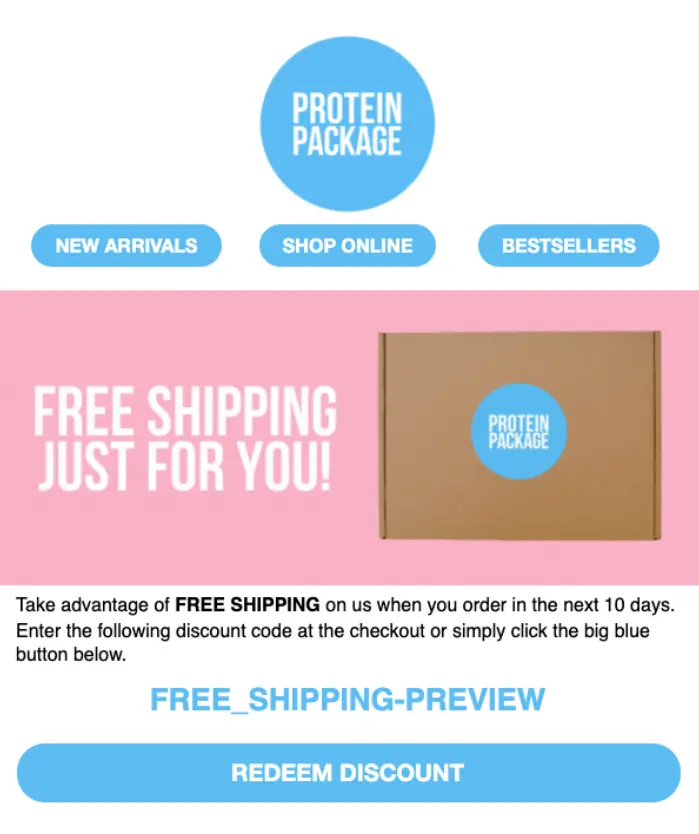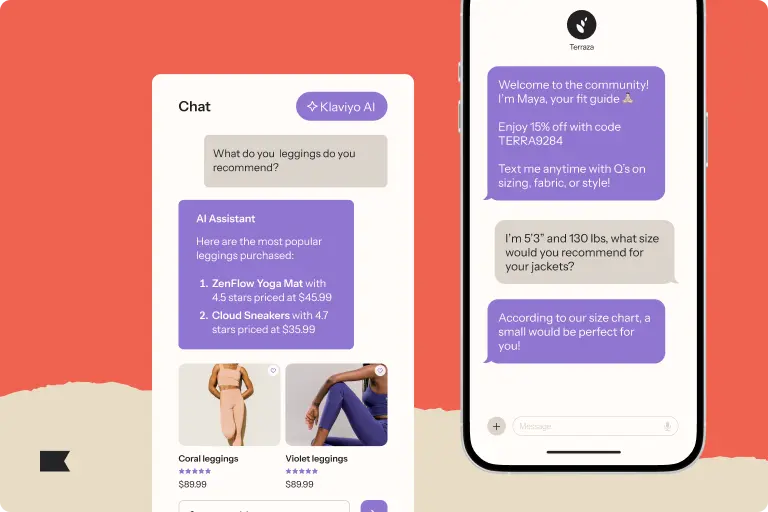Hear from UK brands: how to respond to the Omicron variant
Consumers were hoping for a return to normalcy this Christmas, but the fast-spreading Omicron variant had other ideas.
The first week it was detected in the UK, 250 cases were reported. And the numbers are now exploding, with the country having its highest number of daily positive cases since the pandemic began—and the US seems to be following a similar pattern.
This nearly overnight change impacts brands and their January sales strategies, with marketing teams planning for any number of different scenarios.
Keep reading to learn:
- The widespread effects of this new variant on UK businesses
- Four ways brands will respond to keep customers happy and safe
- How to factor these changes in to your 2022 plans
How Omicron impacts businesses
In-person shopping and events are at risk
Protein Package, UK-based fitness food supplier, was relying on bringing back their in-person events in January, when New Year’s resolutions are in full swing. The brand makes most of its sales in January, and had 15 gym pop-ups booked across the UK.
“With the confusion and uncertainty surrounding the Omicron variant, ten dates have been canceled by the gyms due to senior management opting to limit member to non-member contact as much as possible,” George Greenhill, Protein Package’s owner, explains.“With just five dates now planned to still be going ahead, the cost-per-event of the pop-up stand, all the products, and the equipment have increased three-fold—making them virtually impossible to be profitable.”
The cost-per-event of the pop-up stand, all the products, and the equipment have increased three-fold—making them virtually impossible to be profitable.
George Greenhill, owner, Protein Package
This is just another blow for ecommerce brands that have faced numerous setbacks this year. On top of shipping delays in the UK, merchants are now facing the repercussions of another variant running rampant at one of the busiest times of the year.
There’s widespread hope that the UK won’t go back into a full lockdown, but the government is considering implementing new regulations leading up to Christmas.
Online fulfillment strains may increase
If conditions return to what they were at the beginning of the pandemic, we’ll start to see more people shopping online instead of venturing out to shops. There will also be an increase in the number of online orders for products. This, combined with ongoing shipping delays, may make fulfilment more difficult and the wait time for deliveries even longer.
“Our bestselling brands such as Optimum Nutrition and Grenade have all informed us of high percentage increases to our purchasing prices from January 1,” Greenhill says of recent inflation. “It goes further than the cost of our products—there’s also a huge increase in the price of cardboard packaging.”
How UK brands are preparing for Omicron
It’s never been more important for brands to have a robust ecommerce operation—especially if they want to ride out the next wave of the pandemic. And by putting measures in place ahead of time, brands can get ahead of potential issues like shipping delays and another “pingdemic.”
Pivot to digital channels
Greenhill and his team have spent the past couple of weeks scrambling to change their marketing and CRM strategy, switching up their December email campaigns and rethinking their pay-per-click adverts for the new year.
“In 2022, the single most important thing for us is to ensure that we keep current customers engaged by maintaining positive relationships,” Greenhill says. “And any new customers that we gain from advertising will get the best experience to maximize the chances of them coming back.”
In 2022, the single most important thing for us is to ensure that we keep current customers engaged by maintaining positive relationships.
George Greenhill, owner, Protein Package
To accomplish this goal, Protein Package set up customer winback emails. These communications help keep customers engaged by automatically sending out free shipping codes if they haven’t responded within 30 days to an automated replenishment reminder.

Increase stock to combat shipping delays
Shipping delays have been an ongoing issue for companies. JettProof, an Australian clothing brand with a UK presence, has taken steps to ensure that their British customers aren’t waiting for their packages.
“With current supply chain issues, it takes two to three weeks before items reach the country,” explains Michelle Ebbin, founder of JettProof. “Fortunately, months ahead of the rise of Omicron cases in Europe, we decided to ship an additional number of items to our UK office—this has left us with enough stock to distribute for local orders.”
The team at JettProof also immediately advises customers about possible delays by writing a sincere letter of apology that emphasizes the safety protocols the company has in place during the pandemic.
“By telling customers that new COVID-19 procedures and safety policies are meant to keep our staff and customers safe—they perfectly understand the reasons why there are delays,” Ebbin says. “And the email ends on a positive note, too.”
By telling customers that new COVID-19 procedures and safety policies are meant to keep our staff and customers safe—they perfectly understand the reasons why there are delays.
Michelle Ebbin, founder, JettProof
Limit number of orders
Jake Smith, the founder of Absolute Reg, a UK-based license plate business, has put similar measures in place.
“We’ve already experienced the impact of Omicron, especially in our supply chain operations,” he says, adding that the biggest setbacks have been staff absences and shortages due to confirmed coronavirus cases. “It’s left us with no choice but to limit the number of orders we accept from our clients to cater to all their demands without affecting our products’ fulfillment or delivery timeframe.”
It’s left us with no choice but to limit the number of orders we accept from our clients to cater to all their demands without affecting our products’ fulfillment or delivery timeframe.
Jake Smith, founder, Absolute Reg
Delay price increases due to inflation
Greenhill at Protein Package is also thinking ahead when it comes to supply chain issues. Instead of shocking his customers with the news of a big price increase, he has a different strategy.
“To negate the inflation impact immediately in the New Year, we’re ordering higher volumes of products to avoid the increases, so we can initially keep our prices the same—and then slowly scale them as we run down the inventory,” Greenhill explains.
The goal is to keep prices lower in January, which will give the brand a chance to be competitively priced for a short period of time. The brand can then attract new customers and keep them engaged throughout the rest of the year.
Think ahead with your 2022 strategy
The shift to shopping online has been positive for many retailers—especially those with a robust ecommerce website. And retailers who quickly tackled problems relating to the shipping crisis have seen their efforts rewarded.
But consumers are still looking for brands who share their values and that they can trust. And merchants who can maintain an enjoyable customer experience—despite the inevitable setbacks—will always come out on top.
Here are some effective strategies that brands can use to respond to the effects of the Omicron variant:
- Communicate openly with customers
Add updates to your website, including extra information in transactional emails about delays and potential shipping issues. Advise customers on updated delivery times. - Bring forward final online order dates
Be mindful of current shipping delays and ensure customers are able to get their products before key holidays. - Build deeper relationships
An influx of new online shoppers means more potential long-term customers. Use nurture sequences, customer retention flows, and personalized experiences to reduce churn and keep people coming back. - Think long-term
There’s a good chance that more variants will crop up in the following months, if not years. A contingency plan will help you tackle any future issues.
Omicron has had an impact on holiday shopping, and new regulations will only serve to increase that impact. And price hikes in the supply chain are inevitable.
But if you plan ahead and prioritize your customers—your brand will be in the best possible position to move forward.
Want to show your customers you care? Learn more about how you can strengthen your customer relationships going into the new year.

Related content

Customer service technology in 2026 is integrated, powered by AI, and backed by customer data. Learn what your service stack should look like to exceed rising customer expectations.

AI customer service is expanding fast in 2026. Learn how brands use AI to improve efficiency, customer satisfaction, and loyalty, and unlock new revenue opportunities.

See how Customer Hub, Customer Agent, and Helpdesk powered faster support, reduced tickets, and boosted revenue during Klaviyo Service’s first BFCM.